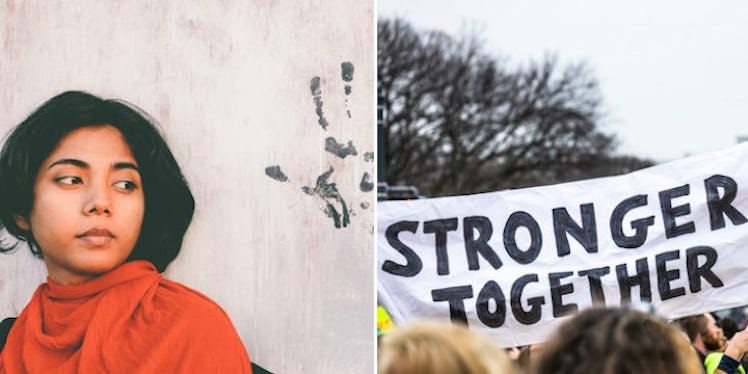
How To Deal With The Stress And Chaos Of A Protest When You Have Social Anxiety
A few years ago, you may have genuinely felt alarmed strolling past an organized protest on your way to work. But now, given the highly turbulent political climate in our country, large-scale protests are happening much more frequently.
In an interview with The Washington Post, sociologist Dana Fisher went as far to say, “Everybody has to get out of class to go downtown because they're chaining themselves to something or they're marching."
These protests particularly happen in major cities like Washington, D.C. They present an excellent opportunity to truly make your voice heard, in a time where so many combative voices are all screaming at the same time.
For many people, though, as passionate as they are about the issues, the large crowds of a protest seem extremely terrifying.
Maybe the idea of proclaiming your political stance via a huge, decorative sign scares the absolute crap out of you, and holds you back from engaging in something you feel really strongly about.
If you struggle with this type of social anxiety, it's natural to feel intimidated by the concept of attending a protest.
But, if you're truly passionate about participating in the cause, there's no reason why you can't make your own signs and march alongside your fellow badass protesters.
Elite Daily spoke with Dr. Julia Samton, a board certified doctor in psychiatry and neurology, to learn how someone with social anxiety can conquer some of these all-too-real fears.
She tells us,
Social anxiety is very common, and it would make some sense that, if you're in a big crowd with lots of people, the anxiety might feel exacerbated just by definition.
However, Samton says she'd never discourage anyone with social anxiety from actually attending a protest.
There are ways to mitigate your nerves both before you find yourself in the crowd, and in the moment when you start to feel overwhelmed.
Samton says,
I'm a very big proponent of meditation. A regular meditation schedule can help with all forms of anxiety. Some people might be able to visualize themselves at the protest, and sort of see themselves in a way where, instead of feeling anxious, they feel more confident and able and committed. That can all be incorporated into meditation sessions.
She also recommends trying exposure therapy, which uses various techniques to gradually expose a person to a scenario that causes them to feel anxious.
Exposure therapy can mean actually going to the crowd of a protest, but other times, it could mean replicating the scenario in the safety of a therapist's office, according to Samton.
Elaborating on creating that type of hypothetical scenario, she continues,
A psychiatrist would basically say, 'I want you to imagine yourself at a protest, and think about all the feelings and the thoughts that come to mind, and really put yourself in that situation.' The therapist would help to foster a protective environment and encourage the patient to engage in some deep breathing. Ultimately, a person can see that they can get to the other side of what they're feeling emotionally.
If you find yourself trying to overcome the anxiety bubbling up in your chest when you're actually at a protest, Samton says it's important to remind yourself of what brought you to the cause and why it matters so much to you.
Plus, if a person with social anxiety can manage to make it through this experience, it only bodes well for how they'll handle similarly stressful situations in the future.
She says,
If you actually go, then you have a sense of accomplishment, and a feeling of having survived it. You may be more like to make the decision to go to another protest, and that would benefit your social anxiety in the end.
As scary as it may be, sometimes we need to lean into our deepest fears in order to truly feed our souls and fulfill our desires.
You can change the world, too. Your social anxiety doesn't have to stop you.
Citations: A scientist who studies protest says 'the resistance' isn't slowing down (The Washington Post), Exposure Therapy (GoodTherapy.org)